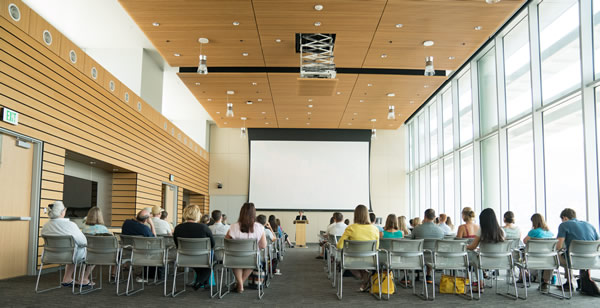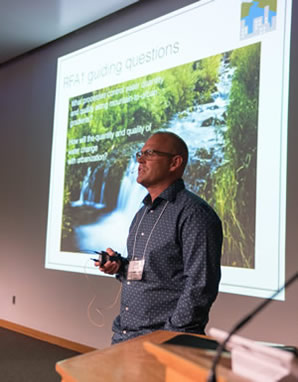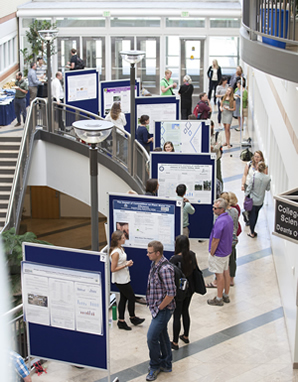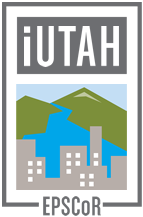News Article
August 25, 2017
iUTAH Symposium Celebrates Five Years of Successes
The final iUTAH Annual Symposium and Summer All-Hands meeting was held over two-days, July 13 -14, on the campus of Utah State University in Logan UT. It was a time for reflection, sharing of successes and outcomes, and celebrating five years of collaborative research, training, education, and outreach for Utah’s water future.
Thank you to all the iUTAH EPSCoR collaborators, partners, and friends who joined us as presenters, participants, and celebrants. For those of you that could not be in attendance, we wanted to fill you in on what you missed, along with personal reflections and comments from invited speakers.
Over 120 researchers and educators from universities, municipalities, and governmental agencies, including industry partners and non-profit organizations, came together on the first day to discuss successful water science programs conducted across the state. iUTAH team leaders talked about critical outcomes and lasting impacts in research on water quality and quantity, social and engineered water systems, and modeling and forecasting of future water supply and demand in the state. These updates were followed by short personal experience stories from five active participants whose research or career paths were altered by involvement in the iUTAH project.
Lunch was held in the company of this summer’s iFellow undergraduate researchers who presented posters of their research and answered questions about what they learned. The symposium concluded with 40 talks in seven concurrent sessions on a broad spectrum of topics. It was exciting to hear about the many ways that iUTAH research, education, and outreach has reached the lives of Utahns across the state.
Friday’s all-hands meeting provided a half-day forum for reflection and celebration. Talks from our three invited speakers kicked off with the Head of NSF EPSCoR, Denise Barnes. She listed the project’s many accomplishments, including GAMUT, career catalyst, personal transformations, collaborative capacity, meaningful relationships with state and municipal agencies, and the surveys and social science data— all key components that have been achieved over five years, and are so valuable to Utah. She “encourages the iUTAH team to keep the collaborative momentum going, and continue to build on the project's success,” and closed by saying “you make NSF EPSCoR look good.”
Next, Tami Pyfer, Education Advisor for the Utah Governor’s Office reflected on her experiences growing up with her dad, a Range Scientist and USU alumnus, including research trips to Ekalaka, MT. Pyfer reflected on our project by saying:
“Governor Herbert continually highlights the need to ‘unite and focus’ our efforts to solve problems and improve the lives of the citizens of Utah. The iUTAH project is a perfect example of what can happen when we truly unite and focus on important issues. It exemplifies the collaboration that is happening between education, government and community organizations, as well as the innovation happening within these entities. As a state we are moving more and more toward evidence-based policy making - which is a good thing - and the work of the iUTAH project provides great information and resources that can be used by local and state policymakers.”
The third speaker of the day was Tamara Goetz, Executive Director of the UTAH STEM Action Center, who started her keynote address with a little history, noting that:
"The iUTAH project has been a fun story to watch unfold. When we first found out that we were qualified to become an EPSCoR state, it was met with mixed emotions. There were some who saw it as an opportunity to secure funding for which there were fewer competitors. However, there were others who were dismayed. They felt that it highlighted our inability to secure federal funding and labeled us as a low performing state. Fortunately the desire to collaborate to address a critical issue, such as water management, in our state prevailed. This positive, "can do" attitude is what has made the iUTAH project a success."
Goetz added that:
"I have been impressed with the iUTAH team and their desire to look beyond research and data generation. They made a commitment to look "outward" and engage a larger stakeholder group in the conversation. They brought the issues to the community, creating dialogue around water use and sustainability, through public perceptions studies and public exhibits such as the one at The Leonardo. They were self-reflective and acknowledged that they needed to improve their own public communication skills and worked with groups like the Alan Alda Center for Communicating Science to help researchers do a better job of communicating the value of their work to those that were not directly involved in research."
iUTAH Project Director Michelle Baker challenged everyone in the room to keep the ball rolling, with regards to collaborations and involvement. While the iUTAH project office will no longer host regular All-Hands meetings, she said that we should take every opportunity to organize iUTAH gatherings associated with other events in the state. Two upcoming examples mentioned were the Salt Lake County Watershed Symposium and Weber State University’s Intermountain Sustainability Summit. This message was further reinforced by a pre-recorded video message from university administrators from across the state, prior to the awards and recognition portion of the morning.
In closing, the iUTAH EPSCoR project has been approved for a one-year no cost extension, through July 2018, and looks forward to connecting with each of you and continuing our valuable research, education, training, and outreach collaborations in the coming year. Our website and newsletters will continue to be updated with achievements, happenings, opportunities, and events of interest to our collaborators. We welcome you to stay in touch and continue to let us know what you are doing.



« Back to list of all news articles


